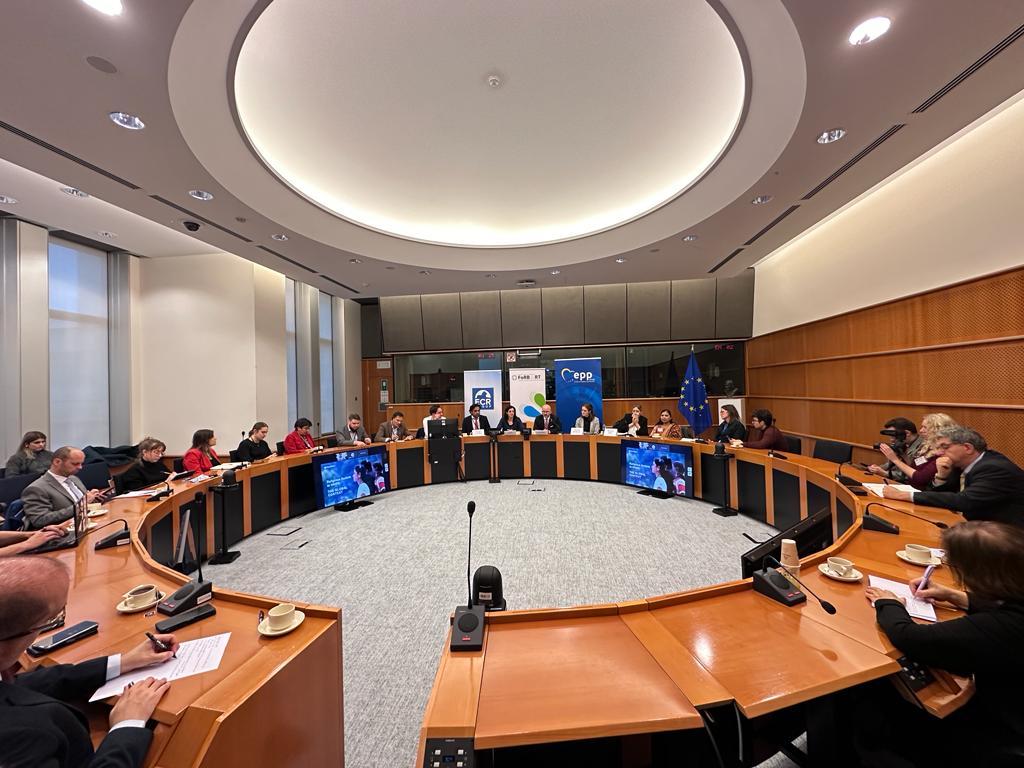Brussels, November 7th, 2023 – A momentous event hosted at the European Parliament by members of the European Parliament, Ajan Haga and Charlie Weimers, brought together lawyers, gender experts, human rights activists, and survivors. They expressed their deep concerns regarding the distressing issue of coerced faith conversion and sexual violence targeting minority women and girls in Pakistan. They called for comprehensive measures to end these practices and ensure justice for the victims in accordance with international human rights standards. This event, supported by INGOs, Jubilee Campaign, and Open Doors, seeks to bring attention to grave human rights violations against minorities in Pakistan.
The participants underscored the significance of the research study “Conversion without Consent” carried out by Voice for Justice and Jubilee Campaign. This study has unveiled disquieting findings, with 79% of the abducted Christian girls having been subjected to abduction, forced religious conversion, child marriage, and sexual violence before reaching the age of 18. Troubling trends involve the falsification of victims’ ages to evade legal consequences and the issuance of fraudulent certificates of conversion by certain religious institutions and political entities.
European Parliamentarians have expressed their profound concerns. Anja Haga, MEP (EPP), voiced her apprehensions, “The human rights abuses in Pakistan are deeply alarming and require urgent attention. We cannot stand idly by while the fundamental rights of minority women and girls are violated.” Charlie Weimers, MEP (ECR), emphasized, “It is imperative that we work collectively to end the injustice faced by minority communities. Our role in the European Parliament is to raise awareness and advocate for change.”
Expert Insights shed light on the harrowing experiences of individuals affected by these practices. Mirjam Bos, an expert from Jubilee Campaign, shared the tragic story of Mishal Rasheed, a 15-year-old Christian girl who was abducted, trafficked, subjected to horrific gang rape, coerced into conversion to Islam, and forced into married with one of her abductors to evade the accountability. Abductors often compel victims to sign documents falsely attesting to their legal age for marriage, as well as their willingness to marry and convert. She stressed, “The evidence points to a disturbing pattern of abuse and victimization of minority girls that demands immediate action.” Rachel Morley, senior researcher on Christian persecution at Open Doors, emphasized, “The plight of these minority women and girls underscores the importance of safeguarding religious freedom and ensuring justice.”
Challenges in Pakistan:
Pakistan’s status as an Islamic state is reflected in its legal and policy framework, often favoring the majority faith. While the Constitution of Pakistan guarantees the right to religious freedom, a government entity (NADRA) responsible for issuing national identity cards restricts religious conversion away from Islam. Conversion from Islam to other religions is socially unaccepted and considered “apostasy,” potentially punishable by death under certain interpretations of Islamic law.
The complex religious landscape in Pakistan, influenced by extremist elements promoting radical interpretations of religion, results in the persecution and marginalization of religious minorities. Influential religious groups and government bodies, such as; the Council of Islamic Ideology and the Ministry of Religious Affairs, have resisted enacting laws against coerced faith conversions, asserting that they are in conflict with Islamic principles.

The Role of Various Stakeholders:
Forced faith conversions of minority girls involve various stakeholders within the Muslim community, including religious clerics, political leaders, police, and judges. These conversions are often justified by the promise of heavenly rewards in the afterlife, in accordance with Islamic beliefs. Akmal Bhatti, a Pakistani Christian lawyer and politician observes that the police often demonstrates biasnes favoring influential parties while portraying child marriages as consensual relationships. The police are reluctant to conduct fair investigations.
Urgent Need for Action:
The issue of sexual violence and forced religious conversion against minority girls and women in Pakistan represents a severe violation of human rights. It demands immediate and comprehensive action to safeguard the rights and well-being of religious minorities.
European Parliament’s Role:
The participants called upon European Parliamentarians to employ diplomatic channels, raise awareness, and advocate for legislative reforms to address the coerced faith conversions and sexual violence in Pakistan. Joseph Jansen, advocacy officer at Jubilee Campaign, the Netherlands, presented the recommendations to the European Parliament for consideration.
Organize a hearing involving victims and affected families of forced religious conversions in Pakistan.
Initiate a debate on coerced faith conversions in Pakistan and propose a resolution urging Pakistan to enact an anti-forced Conversions Act adhering to international standards of religious freedom, as well as amend Child Marriage Restraint Acts to establish minimum marriageable age of 18 years for both boys and girls.
Issue a letter addressed to key authorities in Pakistan, urging them to take meaningful actions to protect minorities from forced religious conversion and sexual violence.
Arrange a visit by European Parliamentarians to Pakistan for meaningful discussions with key stakeholders about improving religious freedom conditions.
Organize a visit by the Special Envoy for the promotion of freedom of religion or belief outside the EU to Pakistan to assess the on-ground situation of religious freedom.
Encourage the EU Commission and EEAS to have the EU delegation question Pakistan, a beneficiary of GSP+ status, and make practical recommendations.


